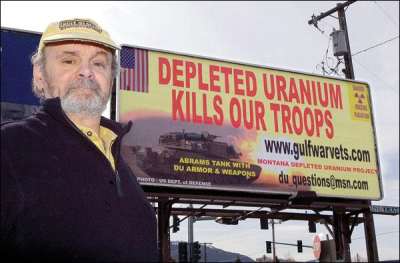| |
 |

Eliza Wiley IR Staff Photographer - Chip Clawson of the Montana
Depleted Uranium Education Project stands near the billboard he raised money
to have installed for the month, in an attempt to increase public awareness
of the dangers depleted uranium has on American veterans.
An unmistakable message?
By MARTIN J. KIDSTON - IR Features Writer - 03/06/07
http://www.helenair.com/articles/2007/03/06/helena_top/a07030607_04.txt
March 6, 2007
The words are bright and
unmistakable, sitting high above Montana Avenue on the latest flashy
billboard.
“Depleted uranium kills our troops,” the message says, depicting an Abrams
tank firing its cannon, along with a warning for “ionizing radiation.”
The billboard doesn’t mention the Helena Peace Seekers, a local anti-war
group that has called the current conflict “immoral and unjust.”
It does, however, list the group’s new subsidiary, the Montana Depleted
Uranium Project, which hopes to use the billboard to raise public awareness
on the use of DU, which it says threatens the health of both U.S. troops and
Iraqi civilians.
“We have DU munitions being used by the military that are endangering our
own troops,” said Chip Clawson, a Vietnam-era veteran who’s funding the
billboard. “These radioactive weapons are certain to devastate the future
health of many troops and many civilians in the countries where we’ve used
them.”
The group’s members also want veterans returning from the war to get
screened for the presence of uranium.
House Bill 288 sought to provide members of the Montana National Guard with
a DU health screening upon returning home. The bill was tabled due to
funding questions.
Clawson said the group has no current evidence that DU has adversely
affected the health of any particular Montana soldier home from Iraq or
Afghanistan. However, he said, he believes that will change in time.
“I have had some possibilities, but we’ve been unable to produce them,”
Clawson said. “We have an incredibly high rate of veterans from the first
Gulf War on disability. We believe DU is part of the problem.”
The Department of Veterans Affairs said DU possesses about 60 percent of the
radioactivity of natural uranium. It poses a hazard if internalized, be it
though shrapnel or inhalation.
Testing DU for military use began in the 1960s. The material was first used
in combat by the U.S. in the first Gulf War.
Joe Foster, administrator of the Montana Veterans Affairs Division, said
that in the four years the current war has been going on, no veteran
health-care provider has filed a claim naming DU as the cause of illness.
“I sent out a memo a month ago, asking them if they’ve processed any claim
based upon depleted uranium,” Foster said. “There were none. It doesn’t mean
it hasn’t happened to any of our soldiers. It’s just that we haven’t seen it
here in Montana.”
Even so, Foster said the VA will place information on its Website about DU,
particularly the three levels of exposure, which range from being hit by a
DU round to being in the general area of a DU incident.
While veterans presented with level-one or level-two exposure to DU have
that exposure documented in their medical records, those who experience a
level-three exposure do not.
“I think what this group wants is to have anyone and everyone in theater
tested for DU automatically,” Foster said. “That just can’t happen unless
they want to pay for it themselves.”
The link on Clawson’s billboard sends viewers to the Gulf War Veterans
Association.
According to the group’s own mission, its single goal is to obtain treatment
for veterans who “experience symptoms collectively known as the ‘Gulf War
Illness.’”
The group claims that the number of Gulf War veterans suffering from the
mysterious illness “has spread to epidemic proportions.” The group also
claims that the government has turned its back on the nation’s defenders.
Yet studies question whether the Gulf War Illness is even a real medical
condition.
A November 1996 article in the New England Journal of Medicine found no
difference in hospitalization rates or self-reported symptoms between
Persian Gulf vets and non-Persian Gulf vets.
“U.S. troops and Iraqi civilians have been exposed to ionizing radiation as
a result of the use of DU munitions in Iraq,” Clawson said. “But many of our
troops haven’t been told about this, nor have they been trained to minimize
the long-term health risks.”
Reporter Martin Kidston can be reached at 447-4086, or at
mkidson@helenair.com
|
 |
|